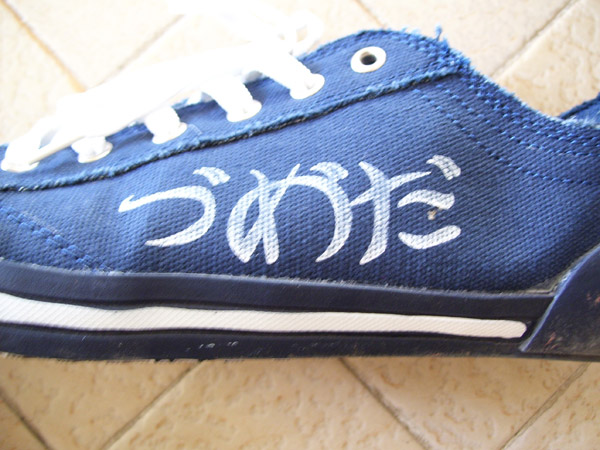
It’s weird, you live with someone for a while and you think you’re familiar with all their stuff… but this morning I found these shoes that apparently belong to one of our housemates. The reason this caught my eye is because (A) I can read a bit of Japanese, or at the very least I know my kana well enough, and (B) we all know the Turkish reputation for printing nonsense in other languages on apparel.
I don’t actually know if these characters in this combination mean anything in Japanese or not, but the reason I’m suspicious is because of that middle character. I’m guessing this was supposed to be printed as “づめだ,” but the second character, me… I’m pretty sure that shouldn’t have the little two-stroke diacritical mark that du (the first character) and da have. I don’t think that modified me character even exists. So I’m thinking this might just be the first example of Turkanese I’ve run across. I wish I knew enough about Japanese to say for sure, but my interest comes more from the direction of a general linguist than that of a Japanese student, and I’m hoping one of you out there who actually reads Japanese can help clear this up. Do these shoes bear some sort of profound message, or is it nonsense?
Actually, now that I think about it, I’ve seen quite a few shirts with Japanese characters at the bazaar… if we can get someone (or a couple of someones) who can analyse them for us, I’ll start taking photos of them and we’ll double our fun.
And speaking of the bazaar, it’ll be back tomorrow in full force, don’t you worry.
Yup, it’s nonsense. I guess they are banking on the fact that most Turks don’t speak Japanese?
Yup, it’s nonsense. I guess they are banking on the fact that most Turks don’t speak Japanese?
I’m not really sure why there’s a dakuten on that me. As far as I have found, there’s no such combination as d/zumeda. However, dume roughly could mean “end” and if they are using da as a copula, then perhaps they’re trying to say something like “the end.” Who knows. I’d be interested in seeing if anyone else has an idea.
I’m not really sure why there’s a dakuten on that me. As far as I have found, there’s no such combination as d/zumeda. However, dume roughly could mean “end” and if they are using da as a copula, then perhaps they’re trying to say something like “the end.” Who knows. I’d be interested in seeing if anyone else has an idea.
Stretching just a bit: read it from right-to-left, and ignore the marks on both “me” and “tsu”. Then you have “Dame!”
But I think I agree with San Nakji – it’s probably nonsense.
Stretching just a bit: read it from right-to-left, and ignore the marks on both “me” and “tsu”. Then you have “Dame!”
But I think I agree with San Nakji – it’s probably nonsense.
[…] First of all, thanks to everyone who weighed in on the mystery of the Hiragana shoes. […]